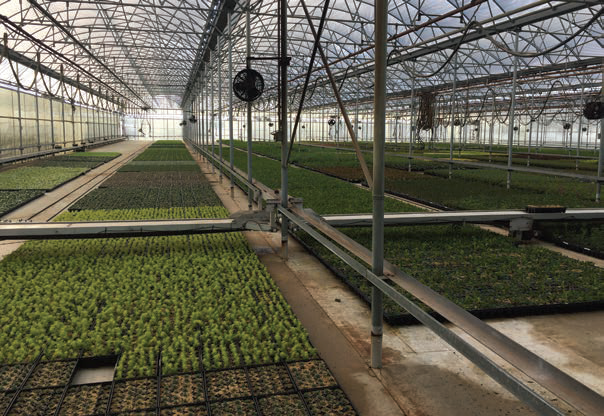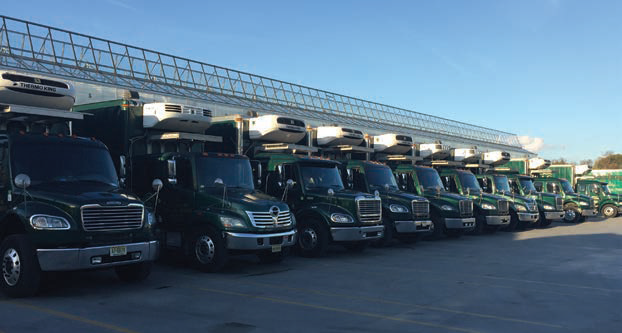Neville Stein shares his insights on the recent industry study tour to the east coast of the US
Many horticulturalists value the opportunity to travel overseas on an educational trip, not only because a study tour provides a welcome break in routine, but also because it provides an opportunity for a rich immersive experience of horticulture. As a frequent study
tour leader and business consultant, I also believe that getting away from a business in the company of other like-minded people can provide a much-needed opportunity to reflect on what’s happening back at home, create and develop networks and be a fun bonding experience for everyone involved.
So, recognizing that study tours can be a useful tool in assisting the development of the nursery sector in Ireland, market development executive at Bord Bia, Gary Graham, along with 16 delegates from across the Irish amenity horticultural sector, embarked on a five-day study tour to the USA in October. Led by myself and Gary, the tour involved visits to nine wholesale nursery production units, three retailers, and two world-class gardens, located in Maryland, New Jersey, and Pennsylvania.
Those familiar with this region will know that the climate for growing nursery stock provides some significant challenges. With winter temperatures dropping on average to -5°C and typically accompanied by significant snowfall, designing growing structures that can withstand heavy snowfall is really important. Likewise, with summer temperatures rising in some areas to 30°C with 100% humidity, ensuring that crops have adequate water is essential. A responsible approach to this issue is evident by nurseries such as Centerton
Nurseries and Overdevest Nurseries who, despite the plentiful supply of water, have developed sophisticated recycling measures.
Whilst there are some climatic challenges to producing plants in the region, the proximity to a large market does, of course, provide an enormous opportunity for growers. As Robert
Blew, owner of Centerton Nurseries says, “We have 50 million people within an eight-hour drive of our nursery”. Blew also stated that, “There are 14,000 independent garden centres in the USA plus another 40,000 big box stores”. No wonder then that the value at farm gate prices of nursery stock produced in New Jersey alone is $2bn.
Significantly, many of the nurseries visited on this tour choose to focus on selling to independent retailers or indeed to those landscapers supplying the high-end domestic market rather than big box stores such as Lowes and Home Depot. Being proud of your price seemed a common theme and importantly many producers did not seriously discount their stock when the recession hit in 2007; rather they chose to maintain their price, focusing instead on the value message. Michael O’Connor, an independent business
consultant in Ireland who attended the study tour believes that for him one of the key lessons from visiting growers on this trip is to “always frame the debate about price in terms of value rather than cost” and as O’Connor suggests, “We need to educate clients as to the true cost of producing quality plants, emphasise the knowledge within our organisations and focus hard on delivering a superior service”.
Like any labour intensive operation, nurseries the world over are not immune to the challenges of ensuring a regular supply of good quality labour. International IPPS president, Alan Jones, and owner of Manor View Nurseries said, “Horticultural education
programmes in the USA are in decline and there is a real concern where the next generation is going to come from”.
“We have 50 million people within an eight-hour drive of our nursery”
Jones is optimistic though that a new programme aimed at encouraging young people to learn about horticulture will help. Part sponsored by Ball Horticulture and involving key players in the horticultural industry, managers on this programme entitled ‘Seize Your Future’ have already produced a video promoting horticulture as a career choice. Jones, like many other nurseries, participates in the government’s H-2A and H-2B programs, which allow USA employers who meet specific regulatory requirements to bring foreign nationals to the country, and it seems in the case of the nursery industry in the region. The majority of these foreign nationals are from Mexico. Despite these government programmes, the nursery industry still struggles to recruit unskilled labour.

In common with the UK and Ireland, the cost of employing people in the USA continues to rise. North Creek Nurseries, who specialise in the propagation of eastern USA native plants, cite labour as their biggest issue in their business. To mitigate at least in part the rising cost of employing unskilled workers, the senior management has embraced lean production concepts, basing a lot of their production processes on lean processes developed by Toyota. Lean management combined with innovative software for labour planning has resulted in significant cost reductions. Commenting on the lean management principles, Teagasc nursery stock advisor Dónall Flanagan noted that, “Some simple changes in production processes can give quick wins”. Likewise, Flanagan also noted that many of the companies visited had flat management structures, with all owners, whatever the size of the business, being very hands on.

We all know that successful businesses are those that are able to cultivate and build good relationships. Combine this ethos with US-style positivity, energy, and enthusiasm, then it is no wonder that business owners like George Lucas of Lucas Greenhouses and Brad Thompson at Foxborough Nurseries have a very low marketing spend, instead relying on their ability to provide superior customer service. As a sales manager, Ed Kiley of The Perennial Farm says, “The people we have in our business are all people pleasers”.
Their house brand, Blew Label Perennials, is just one of 10 brands created, as Bob Blew of Centerton Nursery describes it, “to try to find ways of keeping the little guy competitive”. With the box stores selling a significant number of plants, it is become increasingly important to help retailers differentiate their offering from the multiple retailers. Blew has gone one stage further by printing bespoke point of purchase material for his retail customers.

Having experienced a nursery stock industry in fine form, what does the future hold in this region? Who knows, but the attitude displayed by every nursery owner will see them through future challenges. A willingness to invest even in a downturn, thinking big and not being afraid to make decisions, plus a passion for delivering a superb service should help nursery producers fare well. As Ronan Nangle says, “We have learned from this trip that we need to have confidence, that there is a market for our products, and we do not need to compete on price”.
Travelling with one’s colleagues to a different country to visit nurseries brings fresh insights, new production techniques and processes and renewed enthusiasm. But perhaps more importantly, traveling with one’s contemporaries has additional benefits. Commenting on the benefits of this trip, owner of an online hedging business Adrian Byrne, said, “This trip has enabled me to establish contacts with Irish people that I haven’t seen for a while, find new suppliers and get some different ideas. In addition to learning from USA nurseries I have also been able to learn from my colleagues”. Perhaps most significantly everyone on this trip returned home with the salient reminder that every business needs to have an edge and be different from its competitors. Bord Bia will be producing a detailed report on this trip, available in December. ✽





